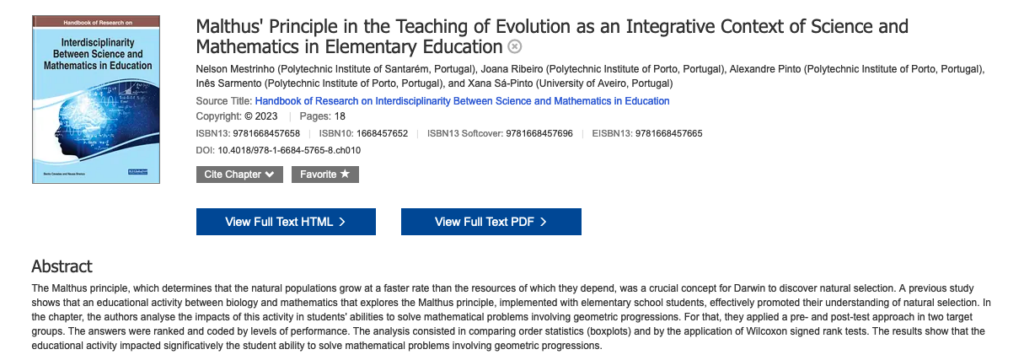Nelson Mestrinho, Joana Ribeiro, Alexandre Pinto (CIDTFF), Inês Sarmento & Xana Sá-Pinto (CIDTFF) | Handbook of Research on Interdisciplinarity Between Science and Mathematics in Education, pp. 224-241

Abstract
The Malthus principle, which determines that the natural populations grow at a faster rate than the resources of which they depend, was a crucial concept for Darwin to discover natural selection. A previous study shows that an educational activity between biology and mathematics that explores the Malthus principle, implemented with elementary school students, effectively promoted their understanding of natural selection. In the chapter, the authors analyse the impacts of this activity in students’ abilities to solve mathematical problems involving geometric progressions. For that, they applied a pre- and post-test approach in two target groups. The answers were ranked and coded by levels of performance. The analysis consisted in comparing order statistics (boxplots) and by the application of Wilcoxon signed rank tests. The results show that the educational activity impacted significatively the student ability to solve mathematical problems involving geometric progressions.
– – – – –
Referência:
Mestrinho, N., Ribeiro, J., Pinto, A., Sarmento, I., Sá-Pinto, X. (2023). Malthus’ Principle in the Teaching of Evolution as an Integrative Context of Science and Mathematics in Elementary Education. In B. Cavadas & N. Branco (Eds.), Handbook of Research on Interdisciplinarity Between Science and Mathematics in Education (pp. 224-241). IGI Global. https://doi.org/10.4018/978-1-6684-5765-8.ch010




